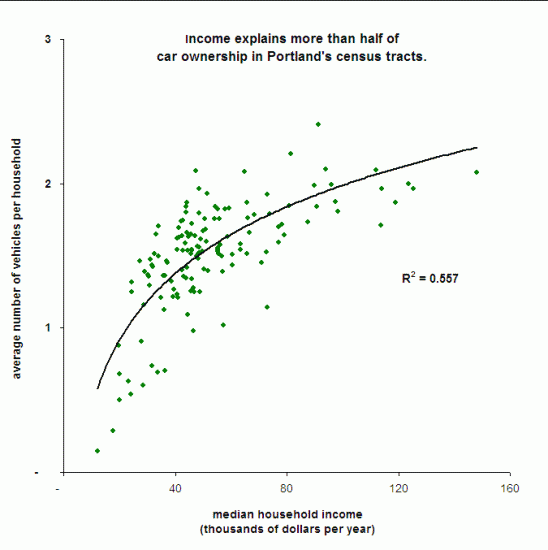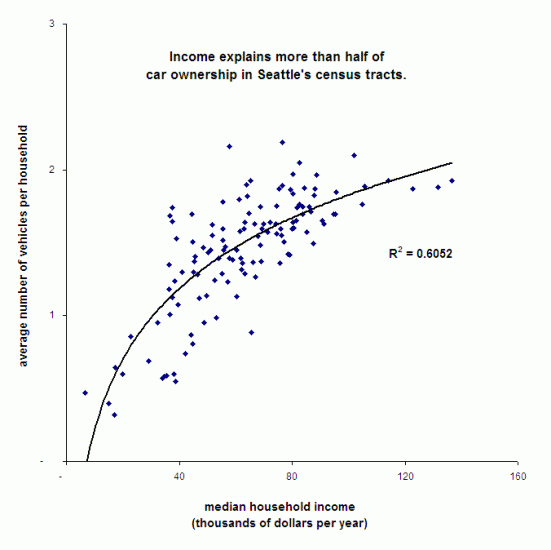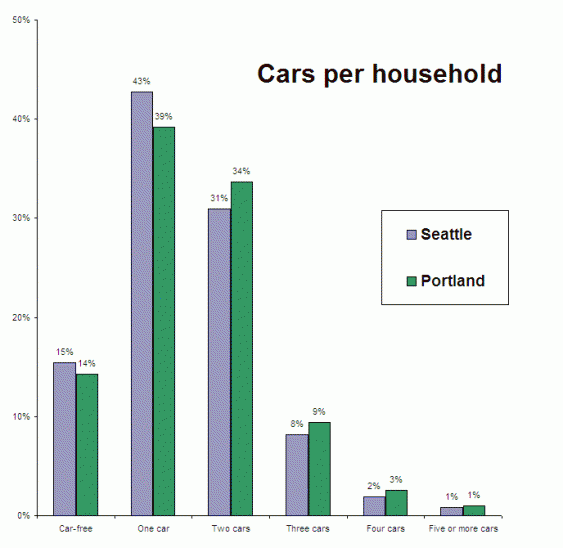It’s somehow become an article of faith that fees related to cars are regressive. Yet to a larger extent, car ownership appears to be a function of wealth. In fact, in the Northwest’s big cities, household income explains more than half of vehicle ownership in neighborhoods: the higher the incomes, the more cars there are — at least up to a point.
Here’s car ownership plotted against income for each census tract in Portland.
Here’s the same chart for Seattle:
On each chart, I plotted a trendline showing a logarithmic regression, which was the closest fit I could identify. (In both cases, a linear regression would have yielded an R-squared of about 0.5.) The trendline is consistent with a sort of diminishing returns: higher incomes correlate with more vehicles per household—but only up to a point. Once a tract’s average household owns around 1.8 or 1.9 cars, higher median incomes don’t seem to continue adding vehicles.
In some ways, this analysis actually tells us a bit less than it seems to. Because I wasn’t able to use primary data for individual households, we can’t determine whether there might be a different relationship between money and cars for individual households as opposed to the household averages of census tracts that I’ve shown here. Another way of saying that: at the individual household level, income may explain less—or perhaps more—about car ownership than it does at the census tract level.
Clearly it’s important to evaluate economic fairness, but there’s evidence that in Northwest cities car ownership is largely a function of wealth. That shouldn’t be surprising, given that vehicles are costly to purchase and maintain, and increasingly they’re quite expensive simply to fuel.
I’d argue that simple economics explain why a large number of city households choose car-free or car-lite lifestyles. Indeed, well over half of all households in Seattle and Portland get by with one car or no cars, while exceedingly few have more than two.
Here’s what the distribution looks like:
Intriguingly, the comparison between the cities suggests that income isn’t everything. Consider that the median household income in Seattle is almost 20 percent higher than in Portland, but vehicle ownership is actually a bit lower. The average household in Seattle owns 1.4 cars compared with 1.5 in Portland.
Tim Rood is a city planner who lives in Seattle.
***
Notes: All figures in the post are derived from the US Census Bureau’s American Community Survey 5-year estimates from 2005-2009 and refer to all census tracts contained entirely within the cities. (One technical note: the Census Bureau provides data at the tract level for the number of households that have “5 or more vehicles,” but we don’t know exactly how many cars these households really have. So to calculate averages for census tracts, we assumed that each of these households owns 5.1 vehicles. Note that even if these households actually own more cars, there are so few households in that category—about 1 percent of total households in each city—that they have little effect on the overall average.) Calculations exclude “unoccupied households.” Finally, it’s worth pointing out that for many census tracts, the data we’ve used come with fairly large margins of error, so some caution is in order.





Comments are closed.